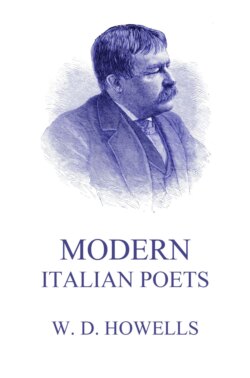Читать книгу Modern Italian Poets - William Dean Howells - Страница 6
На сайте Литреса книга снята с продажи.
III
ОглавлениеThe longing for freedom is the instinct of self-preservation in literature; and, consciously or unconsciously, the Italian poets of the last hundred years constantly inspired the Italian people with ideas of liberty and independence. Of course the popular movements affected literature in turn; and I should by no means attempt to say which had been the greater agency of progress. It is not to be supposed that a man like Alfieri, with all his tragical eloquence against tyrants, arose singly out of a perfectly servile society. His time was, no doubt, ready for him, though it did not seem so; but, on the other hand, there is no doubt that he gave not only an utterance but a mighty impulse to contemporary thought and feeling. He was in literature what the revolution was in politics, and if hardly any principle that either sought immediately to establish now stands, it is none the less certain that the time had come to destroy what they overthrew, and that what they overthrew was hopelessly vicious.
In Alfieri the great literary movement came from the north, and by far the larger number of the writers of whom I shall have to speak were northern Italians. Alfieri may represent for us the period of time covered by the French democratic conquests. The principal poets under the Italian governments of Napoleon during the first twelve years of this century were Vincenzo Monti and Ugo Foscolo—the former a Ferrarese by birth and the latter a Greco-Venetian. The literary as well as the political center was then Milan, and it continued to be so for many years after the return of the Austrians, when the so-called School of Resignation nourished there. This epoch may be most intelligibly represented by the names of Manzoni, Silvio Pellico, and Tommaso Grossi—all Lombards. About 1830 a new literary life began to be felt in Florence under the indifferentism or toleration of the grand-dukes. The chiefs of this school were Giacomo Leopardi; Giambattista Niccolini, the author of certain famous tragedies of political complexion; Guerrazzi, the writer of a great number of revolutionary romances; and Giuseppe Giusti, a poet of very marked and peculiar powers, and perhaps the greatest political satirist of the century. The chief poets of a later time were Aleardo Aleardi, a Veronese; Giovanni Prati, who was born in the Trentino, near the Tyrol; and Francesco Dall Ongaro, a native of Trieste. I shall mention all these and others particularly hereafter, and I have now only named them to show how almost entirely the literary life of militant Italy sprang from the north. There were one or two Neapolitan poets of less note, among whom was Gabriele Rossetti, the father of the English Rossettis, now so well known in art and literature.
